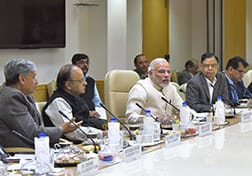
NEW DELHI - In his first such interaction with a set of noted economists and experts organised by Niti Aayog, Prime Minister Narendra Modi on Tuesday called for innovative approaches to budget-making, and a special focus on skill development and tourism. Attending the session on "Economic Policy - The Road Ahead", the prime minister said the budget has a significant effect effect on India's real economy and wanted this yearly exercise...

to be given prime importance. Till date, Modi observed, such exercises earmarked expenditure only at the onset of monsoon, which was not desirable as it results in government programmes being relatively inactive in the productive pre-monsoon months. That is the reason why the presentation date of Budget 2017-18 is being advanced so that a roadmap is ready before the beginning of the financial year, he added. The government has said February 1 will be the date for presentation of future Union Budgets.
The other two major changes to the upcoming budget are converging into it the railway budget and doing away with the Plan and Non-Plan Expenditure.
Niti Aayog Vice Chairman Arvind Panagariya, at a press briefing later, said that the meeting between the Prime Minister and the economists was an experiment where the latter gave presentations on three important focus points - agriculture, jobs and budget related issues. For the agriculture sector, the economists focussed on ways to double the farmers' income by 2022 and expanding the digital payment revolution to include them, he said. "Economists suggested doubling farmer's income by 2022. They discussed digital payments for farmers. There were suggestions on moving to high-value agriculture products," Panagariya added. While in the education sector, the economists suggested the need to improve the quality, there was need felt to increase investments in the tourism sector. "The tourism sector was highlighted. Suggestions were made that we need to invest more in tourism. Also need to have a learning revolution to improve quality of education was emphasised," he added.
A range of other issues covering subjects such as skill development, taxation and tariff related matters, digital technology, housing, tourism, banking, governance reform, data driven policy and future steps for growth were discussed.
Besides Niti Aayog and Finance Ministry officials, the session was attended by economists and experts, including Pravin Krishna, Sukhpal Singh, Vijay Paul Sharma, Neelkanth Mishra, Surjit Bhalla, Pulak Ghosh, Govinda Rao, Madhav Chavan, N.K. Singh, Vivek Dehejia, Pramath Sinha, Sumit Bose and T.N. Ninan. The Prime Minister's meeting with experts to take stock of the economy assumes significance against the backdrop of the cash crunch post the November 8 demonetisation of high-value currency.
The other two major changes to the upcoming budget are converging into it the railway budget and doing away with the Plan and Non-Plan Expenditure.
Niti Aayog Vice Chairman Arvind Panagariya, at a press briefing later, said that the meeting between the Prime Minister and the economists was an experiment where the latter gave presentations on three important focus points - agriculture, jobs and budget related issues. For the agriculture sector, the economists focussed on ways to double the farmers' income by 2022 and expanding the digital payment revolution to include them, he said. "Economists suggested doubling farmer's income by 2022. They discussed digital payments for farmers. There were suggestions on moving to high-value agriculture products," Panagariya added. While in the education sector, the economists suggested the need to improve the quality, there was need felt to increase investments in the tourism sector. "The tourism sector was highlighted. Suggestions were made that we need to invest more in tourism. Also need to have a learning revolution to improve quality of education was emphasised," he added.
A range of other issues covering subjects such as skill development, taxation and tariff related matters, digital technology, housing, tourism, banking, governance reform, data driven policy and future steps for growth were discussed.
Besides Niti Aayog and Finance Ministry officials, the session was attended by economists and experts, including Pravin Krishna, Sukhpal Singh, Vijay Paul Sharma, Neelkanth Mishra, Surjit Bhalla, Pulak Ghosh, Govinda Rao, Madhav Chavan, N.K. Singh, Vivek Dehejia, Pramath Sinha, Sumit Bose and T.N. Ninan. The Prime Minister's meeting with experts to take stock of the economy assumes significance against the backdrop of the cash crunch post the November 8 demonetisation of high-value currency.

 RSS Feed
RSS Feed
